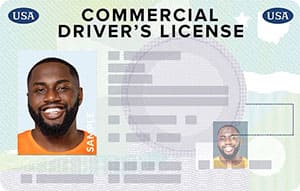- Updated for December 2024
- Based on 2024 NY commercial driver's license manual
Free New York CDL Combination Practice Test 2024
A variety of economic opportunities for semi-truck and tractor-trailer drivers exist in New York. Key economic sectors employing combination truck drivers to transport their products include manufacturing, retail, and agriculture. Numerous high-tech manufacturing companies in the state depend on truck drivers to deliver equipment and materials to them and transport their products. In addition, New York’s ports and border with Canada make the state a logistics gateway. The Port of New York and New Jersey is one of the largest port complexes on the East Coast, handling a large volume of foreign containerized cargo shipping. Tractor-trailer drivers can find employment in container transport from the ports to markets and distribution centers.
One of the most important truck routes in New York is Interstate 90, heavily used for freight moving between Boston, Massachusetts and Seattle, Washington. Interstate 87 is a key route for cross-border trade with Canada, running northward to the Canadian border and then into Quebec. Interstates 78, 87, and 95 are used by truckers hauling cargo from the Port of New York and New Jersey.
There are three classes of Commercial Driver’s Licenses (CDLs): Class A, Class B, and Class C. A Class A CDL allows you to operate combination vehicles with a Gross Combination Weight Rating (GCWR) of 26,001 pounds or more, in which the towed unit weighs more than 10,000 pounds. You must obtain a Class A CDL to drive semi-trucks or tractor-trailers.
Before you can obtain a CDL, you must first master the theory and practice of commercial driving. To show you’ve mastered the theory, you must pass the official General Knowledge test. However, to obtain a Class A CDL and drive semi-trucks or tractor-trailers, this is not the only knowledge test you must pass. At a minimum, you must also pass the official Combination Vehicles knowledge test to show that you understand the theory of operating combination vehicles. Otherwise, your CDL will include a restriction prohibiting you from operating tractor-trailers, which will essentially defeat the purpose of obtaining a Class A CDL.
We can help you pass the Combination Vehicles knowledge test! This free New York CDL Combination practice test contains 30 questions and answers on such topics as combination braking systems, coupling units, pre-trip inspections, and safe driving techniques. It’s based on the official New York Commercial Driver’s Manual (New York CDL Handbook 2024), just like the official knowledge test. And it’s structured similarly and up to date as of December, 2024. But unlike theirs, ours comes with an available hint to lead you to the correct answer and an explanation of the correct answer.
- Perfect for first-time and renewal CDL/CLP applicants, and those adding endorsements
- Triple-checked for accuracy
What you need to know

What to expect on the actual NY DMV exam
questions
correct answers to pass
passing score
Helpful links
List of questions (classic view)
- To prevent a rollover while driving a combination vehicle, you should
- The final trailer of a triple is _______ as likely to roll over as a five-axle tractor-trailer.
- To straighten out a jackknifing trailer, should you apply the trailer hand brake?
- When parking a vehicle that does not have spring brakes, you should use wheel chocks
- What does the trailer air supply control do?
- The trailer air supply knob will pop out when the air pressure drops to
- If you use the trailer hand valve while you're driving,
- If you are driving a 90-foot combination vehicle at 50 mph, you should leave how many seconds of following distance?
- Which of the following is NOT part of checking that air is flowing to all trailers?
- After coupling, how much space should there be between the lower and upper fifth wheel?
- Which of the following control air in the service line?
- If you try to couple when the trailer is too high,
- Which of the following types of vehicles are most likely to get stuck at a raised railroad crossing?
- Which of the following is NOT part of inspecting the coupling?
- Where would you find the shut-off valves?
- When you're coupling a tractor-semitrailer, which of the following is NOT a part of inspecting the fifth wheel?
- Which of the following is NOT a purpose of the emergency air line?
- Which of the following is NOT part of inspecting the sliding fifth wheel during a walk-around inspection?
- Which of the following is NOT part of raising the landing gear if equipped with a low gear range?
- Which of the following is NOT part of testing the trailer service brakes?
- What is the definition of "off-tracking?"
- Which of the following is NOT part of testing the tractor protection valve?
- Which of the following offtracks the most?
- To back a trailer, what should you do?
- If you must back your vehicle on a curved path, you should back toward the driver's side because
- Loss of air pressure in the emergency line causes
- Which of these statements is true?
- If you cannot make a right turn without swinging into another lane, what should you do?
- If there is a major leak in the _________, the tractor protection valve will close and the trailer emergency brakes will come on.
- The rear wheels of which vehicle will off-track the most?
- Alabama: Test 1 / Test 2
- Alaska: Test 1 / Test 2
- Arizona: Test 1 / Test 2
- Arkansas: Test 1 / Test 2
- California: Test 1 / Test 2
- Colorado: Test 1 / Test 2
- Connecticut: Test 1 / Test 2
- Delaware: Test 1 / Test 2
- District of Columbia: Test 1 / Test 2
- Florida: Test 1 / Test 2
- Georgia: Test 1 / Test 2
- Hawaii: Test 1 / Test 2
- Idaho: Test 1 / Test 2
- Illinois: Test 1 / Test 2
- Indiana: Test 1 / Test 2
- Iowa: Test 1 / Test 2
- Kansas: Test 1 / Test 2
- Kentucky: Test 1 / Test 2
- Louisiana: Test 1 / Test 2
- Maine: Test 1 / Test 2
- Maryland: Test 1 / Test 2
- Massachusetts: Test 1 / Test 2
- Michigan: Test 1 / Test 2
- Minnesota: Test 1 / Test 2
- Mississippi: Test 1 / Test 2
- Missouri: Test 1 / Test 2
- Montana: Test 1 / Test 2
- Nebraska: Test 1 / Test 2
- Nevada: Test 1 / Test 2
- New Hampshire: Test 1 / Test 2
- New Jersey: Test 1 / Test 2
- New Mexico: Test 1 / Test 2
- New York: Test 1 / Test 2
- North Carolina: Test 1 / Test 2
- North Dakota: Test 1 / Test 2
- Ohio: Test 1 / Test 2
- Oklahoma: Test 1 / Test 2
- Oregon: Test 1 / Test 2
- Pennsylvania: Test 1 / Test 2
- Rhode Island: Test 1 / Test 2
- South Carolina: Test 1 / Test 2
- South Dakota: Test 1 / Test 2
- Tennessee: Test 1 / Test 2
- Texas: Test 1 / Test 2
- Utah: Test 1 / Test 2
- Vermont: Test 1 / Test 2
- Virginia: Test 1 / Test 2
- Washington: Test 1 / Test 2
- West Virginia: Test 1 / Test 2
- Wisconsin: Test 1 / Test 2
- Wyoming: Test 1 / Test 2
Your go-to, trusted source
Experience the Driving-Tests differenceOur commitment to accuracy and quality in our practice tests
Explore our rigorous, multi-tiered verification process that ensures each question mirrors the official manual for unparalleled accuracy.

At Driving-Tests.org, we understand the importance of reliable and accurate practice tests to help you prepare for your DMV exam. That's why we've developed a meticulous process to create and continually update our practice questions, ensuring they reflect the most current driving laws and regulations.
Here's an inside look at how we maintain the highest quality in our practice tests.
Content Creation and Verification Process
- Alignment with Official Manuals:
Every question we develop is based on the most recent version of each state's official driving manual. Our team regularly monitors each state DMV's website for the latest updates to ensure our practice tests are always aligned with the most current information. - Community Feedback Integration:
We leverage feedback from our vast community of users to understand which topics are most frequently tested. This helps us focus on the areas that are most relevant and beneficial for your preparation. - Expert Content Creation:
Our in-house editor, Steven, who has extensive experience in driver education, crafts each question with precision. He conducts a thorough review of each question against the official manuals to ensure accuracy. - Rigorous Review Process:
Once Steven has finalized a set of questions, our team conducts a joint review session. This second level of scrutiny involves content accuracy, proofreading, and fact-checking to eliminate any errors. - User Feedback Mechanism:
After a question goes live on our site, we keep the lines of communication open. Each question features a feedback button, inviting users to report any issues or errors. This continuous feedback loop allows us to address and rectify any concerns promptly. - Responsive Updates:
In line with our commitment to accuracy, we quickly update our practice questions to reflect any changes in the DMV manuals. Additionally, we update the free electronic copy of the state's driver's license manuals on our site, typically within a few days after the DMV publishes them.
Our thorough quality control process ensures that you have access to practice tests that are as accurate and up-to-date as possible. We believe in the power of well-prepared drivers and are dedicated to providing you with the best study tools to help you succeed on your DMV exam.
